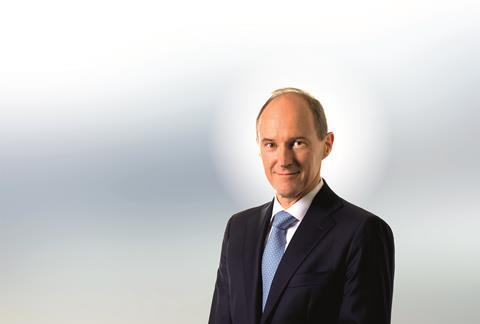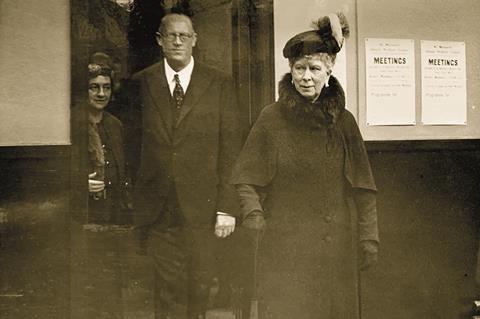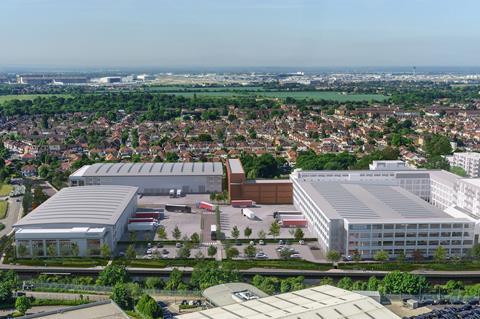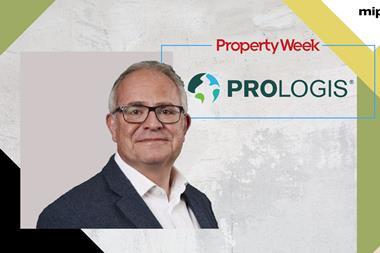Captain Tom is not the only one whose 100th birthday could not be properly celebrated this year. On Tuesday 19 May, SEGRO should be proudly launching its £10m Centenary Fund and kicking off its centenary celebrations with a glitzy all-office conference and party attended by all 350 staff from its dozen or so offices across Europe.

Instead, the fund was launched a month early to help tackle the Covid-19 pandemic and the big party has been put on ice. The group that started life in 1920 as The Slough Trading Company, the owners of a vast industrial site in Berkshire used to repair 17,000 military vehicles from World War 1, will roll out the virtual bunting for an online celebration involving quizzes, challenges and Skype. Chief executive David Sleath will ‘broadcast’ to his SEGRO colleagues from his family home in Warwickshire.
It is not the way he had intended to celebrate the achievements of a business at the heart of which remains the estate where The Office was filmed, Mars invented the Mars Bar, Thunderbirds was made and Ford’s famous GT40 model was produced.
But sporting a polo shirt rather than customary shirt and tie for a Skype interview with Property Week ahead of the milestone anniversary, he is remarkably sanguine as he looks back over 100 years of SEGRO, reflects on his 14 years with the business – nine as chief executive – and ruminates on what lies ahead.
First, though, he is looking forward to Tuesday’s online bash. “We have switched from a very professional, polished style and presentation to a homemade Blue Peter style, but in a way, it’s much more authentic,” he says.
“It’s about having a bit of fun and accepting that we’re in a really extraordinary situation.”
Fortunately, the extraordinary situation may prove more of a help than a hindrance to the industrial Goliath.
It’s a company that always wants to do the right thing with our partners, staff and community
Although its market capitalisation has slipped from £9.9bn to £9.17bn, it is in the sector expected to emerge strongest from the crisis and was in rude health going in.
“I get a lot of energy from seeing how the business is in such great shape,” says Sleath. “It’s not always been flavour of the month. We’ve had some tough times over the last hundred years. But it’s been innovative, very community focused and very thoughtful around its stakeholders.
“I think it’s positioned for many years of success going into the second century, because we’re right in the sweet spot these days, not because of the virus, but because of the changes everybody knows have been happening.”
One of those changes is, of course, rising awareness of the climate crisis and ESG agenda. While SEGRO has put its money where its mouth is with the Centenary Fund, which the whole board voluntarily decided to waive 25% of their salaries for three months to fire up, Sleath is keen to point out that the focus on ESG has been in its DNA from the beginning.
“I’ve always felt it’s a company with a fantastic moral compass, one that clearly wants to make money for shareholders, but always wants to do the right thing with our partners, with our staff, with our community.”
He cites the fact that it launched the Slough Industrial Health service a year before the NHS was created, providing free healthcare to thousands on the trading estate. “It’s typical of the sort of thing our predecessors did,” he says proudly.
Need to modernise
A more recent trend SEGRO has tapped into is the rise of e-commerce. Sleath is often credited with being one of the first to identify the trend. However, it was not online retail that initially caught his eye.
When Sleath joined what was then Slough Estates as finance director in 2006, the chairman was Sir Nigel Mobbs and the chief executive was ex-Sainsbury’s property director Ian Coull.
“It was Ian’s first job as a chief executive and he recognised along with Sir Nigel the need to modernise and change the business,” recalls Sleath. “Ian had started the process of trying to bring the business back to its roots, which was around being a European industrial company.”

Then in 2010, just after the global financial crisis, Coull decided to retire. At that point, the going was tough for everyone, including SEGRO. “We were lucky that we managed to come out in one piece and then even luckier that we had acquired Brixton,” says Sleath.
The 2009 Brixton acquisition was one of two transformational deals for SEGRO during that period, the second being its purchase of a 50% stake in Heathrow Airport property partnership APP. However, it was not yet clear where it wanted to go as a business. It needed look no further than its own back yard for inspiration.
“We had landed our first data centre almost by accident in about 2008,” says Sleath. “In 2006, the Slough Trading Estate had a lot of really old industrial property – it literally had tumbleweed blowing across it – and I remember scratching my head and thinking: what on earth are we going to do with all this space? The joke is, we started digging and we didn’t find oil, we found fibre optic cable.”
Brilliantly positioned
It wasn’t any old fibre optic cable, though. It was a critical line that ran from east London, through Canary Wharf and the City out to the Thames Valley, splitting just west of Slough, one line going down through Cornwall and across the Atlantic, the other through North Wales and across the Atlantic. In short, Slough was brilliantly positioned to be a data hub. SEGRO had stumbled on the nascent data centre industry.
Sleath concedes serendipity has played a role in the success of the business. “Some of it was brilliant strategic planning and some of it is luck and you absolutely need both,” he says.

Having benefited from the latter, he and his team started to focus on the former and rethink SEGRO’s whole strategy. “We had too many fingers in too many pies,” he says, alluding to the mix of retail, office and turnaround assets it owned. “We decided to focus on a smaller number of geographic markets where we could have scale.”
SEGRO specifically targeted locations where the supply demand fundamentals were strong in terms of the likely growth in population, e-commerce and other support services. Then it got rid of everything that didn’t fit that tight definition, offloading around 40% of its portfolio.
What was important was that we redeployed capital and had a tighter strategic focus
Sleath has no regrets. “I’ve no doubt that until fairly recently, the buyers of those portfolios were doing very well out of it, but that really wasn’t important,” he says. “What was important was that we redeployed the capital and had a tighter strategic focus.”
The newly focused team then set about repositioning the business. Having already amassed more than £1bn of assets in Germany, France, Poland and Italy, it has expanded further into Continental Europe and is now targeting £500m plus worth of business in smaller markets such as Spain, the Czech Republic and the Netherlands.
The other big push has been into big box warehousing. “Our USP has been around urban, which is great because that’s where you tend to get the strongest rental growth and the supply demand dynamic is tightest, but it’s more management intensive and we think being able to offer the big box part of the supply chain as well as the urban piece is a very natural thing to do.”
As well as adding big box space through expansion into Continental Europe, SEGRO bought Roxhill in the UK, giving it a portfolio of big box development sites in the South East and Midlands.
With industrial assets becoming increasingly popular and therefore expensive, it also switched from just buying to development.
The Roxhill acquisition proved integral, as did the acquisition of the leading logistics developer in Northern Italy, Vailog. SEGRO tripled the scale of its development programme over three years, raising equity twice to fund that growth.

This, coupled with limited exposure to weaker sectors such as retail, sent its share price northwards. The upshot of all this activity was that in 2018, SEGRO leapfrogged Landsec to become the UK’s largest listed property company. Incredibly, the business now accounts for 20% of the value of the UK listed sector and is also more than twice the size of Landsec (£4.06bn).
While Covid-19 presents a significant short-term challenge, Sleath is upbeat about the long-term future. Multi-storey and beds and sheds schemes remain on the agenda – he hopes to launch some multi-storey schemes in London shortly – and SEGRO is also set to roll out its new flexible brand FLEXI and looking at retail warehouse parks with a view to converting them to industrial use.
Online opportunity
The accelerated rise of online retail figures prominently in Sleath’s thinking. “A lot of people that have used internet retailing for the first time will have established a habit they won’t change,” he says, adding that supply chains are likely to evolve more rapidly as a result of Covid-19, particularly in online grocery, which has not been able to cope with the huge increase in demand.
He also anticipates more investment in automation. “Robots don’t have a problem with social distancing,” he quips.
Sectors such as aviation, food and drink and entertainment are a different story. As Stifel noted in its recent analyst report upgrading SEGRO to ‘buy’, it receives 12% of rents from cargo handlers.
Our customers face cashflow pressures. We’re trying to take a sensible approach and work with them
Despite such exposure, Sleath claims the company has now collected around 80% of what was due on the last rent quarter day. He is not complacent, though. The real test will come on the June rent quarter day, when most businesses will have spent the best part of three months in lockdown.
“It’s going to be more challenging,” he concedes. “Our customers face a number of cashflow pressures. What we’re trying to do is take a sensible, pragmatic approach and work with them where there’s genuine cashflow pressure, but it is a fundamentally sound business.”
One area where the pressure has already eased somewhat is construction, which having ground to a halt had already got going again before Boris Johnson’s announcement at the weekend.
“I think pretty much everywhere now we are operating again with appropriate [social distancing] measures,” says Sleath. “There will be some delays to completion of some of the projects, but they are relatively modest. We are typically talking about a couple of weeks or a month.”
With plenty of work still on, SEGRO has not had to furlough anyone in the business, adds Sleath. Neither has it followed the herd in cancelling dividend payments, as Landsec did this week. “Our view is we’re in a relatively strong place and a strong sector,” he reasons. “It was very much about 2019’s results, which had been strong.”
Sleath is just thankful the tech is there to make working from home possible. “If we’d had this in 2008 or 2009, we wouldn’t have been able to cope,” he says.
Another plus is being able to spend more time with his family, but he misses work – one aspect in particular. Recently, he used his allotted hour of daily exercise to cycle to a new bridge SEGRO has had to build across the A46 for a new logistics park in Coventry.
“It’s about 10 miles away. I just had to go and see this thing and it was actually there,” he sighs wistfully. “I really miss going out to sites.”
Whether working from home, in the office or onsite, SEGRO is better placed than most to ride the storm. It has £1.2bn in cash and undrawn facilities and trading remains positive. Sleath says there is interest from online and other players in new space and that it is well positioned to take advantage of development opportunities that arise, although he takes umbrage at the phrase ‘take advantage’.
“It’s almost distasteful in this environment,” he says. “We want to make the best of the recovery.”
ESG agenda
If Covid-19 has taught Sleath anything, it is that many supply chains are not fit for purpose in an increasingly digital world. He predicts that we will see more onshoring of activity, more localisation and more local sourcing, which he says will be “good from a sustainability and resilience perspective”.
He also believes the ESG agenda will become more important, although he is no fan of net zero carbon targets: “I’m much more interested in the fundamental things we can do in our portfolio, whether it’s solar panels, improving biodiversity, providing more community space, energy efficiency or water recycling.”
Meanwhile, he has no intention of rushing back to doing five days a week in the office when the lockdown ends. “I’m going to try and have a little bit more balance in my life,” he says, also quashing rumours he might be thinking about moving on. “I’ve got no plans to go anywhere, anytime soon.”
As SEGRO prepares to enter its second century, Sleath feels he still has a job to do. “Ultimately, the job of a steward of the business, which you are as a CEO, is to make sure that the company you leave is in better shape than the one you inherited.”
Even with a global pandemic to contend with, he should have little to worry about on that score.
































No comments yet